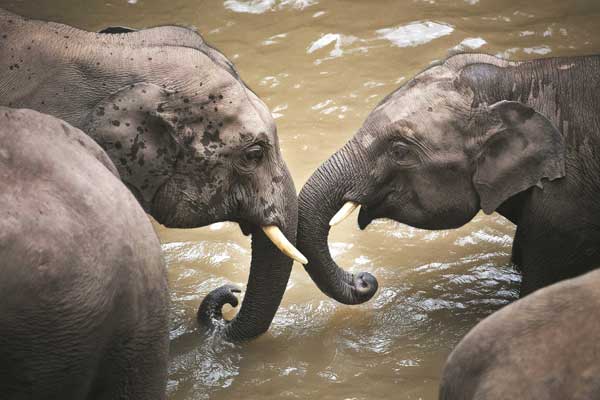Elephantine zeal
Updated: 2015-04-03 07:56
By Raymond Zhou(China Daily)
|
|||||||||||
 |
|
Wild elephants enjoy fun in the water in the forest in Yunnan province, one of the few habitats of the endangered species in China. Photo provided to China Daily |
Natarajan Ishwaran has a special affinity for the Asian elephant. It roams wild in his country, Sri Lanka, where domesticated ones are used to take tourists around. He studied the animal through his doctoral program. Now he uses state-of-the-art technology to promote the conservation of natural habitats for them and other creatures.
All this from his Beijing office at International Centre on Space Technologies for Natural and Cultural Heritage, a United Nations agency, where he is a visiting professor.
Ishwaran served in UNESCO from 1986 to 2012. He is an expert on wildlife that also includes "small and less-known animals and plants", he says.
But he does not hide his preference for "the big ones" because they "give the inspiration for a much broader range of life to be conserved".
The Asian elephant is "a symbolic animal" and "an iconic species" just like the giant panda in China, Ishwaran says, adding that big animals are more difficult to keep than smaller ones whose spatial requirements are more modest.
Although China has many nature reserves, some aren't well protected while others have "intervening areas" that are used for farming and forestry and even include small towns. The requirements of people often become major challenges to biodiversity and the protection of big animals in particular.
"Wolong (in Sichuan province) alone is not enough to protect the giant panda", an animal that has been the symbol of World Wide Fund for Nature since its founding in 1961, he says.
Big animals also feature more prominently in local culture and economy. The Asian elephant has been used in wars, temples and the timber industry, he says, and in India, the elephant-faced deity Ganesha is worshipped. The challenge is especially acute in Asia, where the growth of the human population has put much pressure on open spaces.
Ishwaran, 63, however, isn't an activist who goes around carrying a plaque that reads, "no humans allowed".
Balancing development and conservation is case by case, he emphasizes. You cannot adopt the same protective measures in elephant country as in tiger territory. For one thing, elephants may come and raid your crops whereas tigers come to eat your chickens and goats!
Things like elephant raids are not a daily occurrence and there should be insurance and compensation schemes to offset financial losses suffered by local farmers, he suggests. But since China's elephant population is so low, there is no doubt in his mind that incidents like the occasional crop raid have little danger of upsetting the larger picture.
The big picture, of course, is that human activities are intruding into wildlife. The conflict has forced Ishwaran to think about the way agriculture is conducted, especially in Asian countries like China.
"Perhaps there are opportunities to reform the ways (in which) rural land is used," he says. "Perhaps you don't need to focus on the old way, small-scale agriculture but shift to the model of less land and higher productivity."
Related Stories
Hit reinvigorates Tiger Mountain 2015-02-02 07:41
Wisdom is seeing life for what it really is 2015-01-14 15:47
A filmmaker's real-life drama 2014-12-25 07:26
Best bets along Beijing's backbone 2014-12-08 07:39
Without a safety net, dead on the net 2014-12-06 11:17
Today's Top News
54 dead after Russian trawler sinks in ocean
Death toll rises to 147 in Kenya university attack
Dozens killed in Kenyan university attack
Video of final seconds aboard Germanwings plane discovered
British Prince Harry reports for duty in Australia next week
Chinese World War II veterans to receive medals from Russia
Lufthansa insurers set aside $300 mln over crash
Sarkozy makes political comeback
Hot Topics
Lunar probe , China growth forecasts, Emission rules get tougher, China seen through 'colored lens', International board,
Editor's Picks

|

|

|

|

|

|






